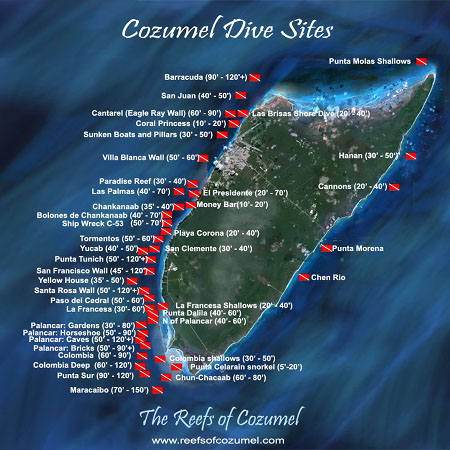Cozumel is Mexico's largest Caribbean island located off the coast of the Yucatan peninsula. Originally inhabited by the Mayans as far back as 300 AD, the island now has a population of about 75,000. Many of the island's residents are employed in the tourism sector which is now the prevalent industry. A television show in the the 1960s documented by Jaques Cousteau raised awareness of the reefs surrounding Cozumel and since then scuba diving in Cozumel has done nothing but grow. Cozumel welcomes more than 2.5 million visitors every year..!
What was once a small village that attracted adventuresome travellers from the glitzy hotels at Cancun, Cozumel has grown into its own destination famous for the suburb scuba diving. Cozumel now is a port of call for cruise ships and the passengers enjoy the shopping, restaurants, ancient ruins, beach clubs and ocean activities…an of course, diving. The all-inclusive resorts like the Occidental Grand, the Allegro, the Aura and other dotting the island's West coast take full advantage of beautiful sand beaches providing families fantastic vacation opportunities. Besides large all-inclusive resorts there are a number of resorts that cater specifically to the scuba dive crowd. These resorts often feature their own dive operation, underwater photography, and PADI or SSI training facilities.
There are more than forty (40) major dive sites around the island with the majority on the West side. The dive sites range in experience level offering spectacular diving for the novice diver as well as the highly experienced. Well-known to divers are Maracaibo, Columbia Deep, Palancar, Santa Rosa Wall, Tormentos, and Devil's Throat. These sites are all part of the Mesoamerican Reef, the largest reef system in the Americas. Some of the dive sites like Tormentos offer exciting strong current drift dives on occasion.
With temperatures ranging from the mid-80s in the summer to mid-70s in the winters, the climate attracts beach lovers all year around. Water temperatures range from 77 to 82 F and underwater visibility is usually excellent.
Wildlife is plentiful with iguanas, tree frogs, crocodiles, frigate birds, brown pelicans, cormorants, and other sea birds. Underwater you will find the reefs teeming with vibrant sea life, tropical fish, turtles, eels, eagle rays, queen angelfish, and the illusive magnificent toadfish. More than 250 species inhabit Cozumel's reefs. And on the less inhabited East side, endangered sea turtles nest and baby turtles can be found in their mad dash to the ocean in hatching season.
In 1966 the Mexican government recognized the importance and fragility of the island's reefs and lagoons and declared much of the area area as "Arrecifes de Cozumel" National Park. Government biologist constantly monitor dive sites to determine if diving is impacting specific areas, and if so, certain sites are temporarily closed allowing fish populations and corals to recover.
Our scuba diver recommendations:
Don't dive with gloves or knives.
Maintain your buoyancy control; stay above the corals and reef; watch where your fins are kicking.
Use a non-oily biodegradable sun block
